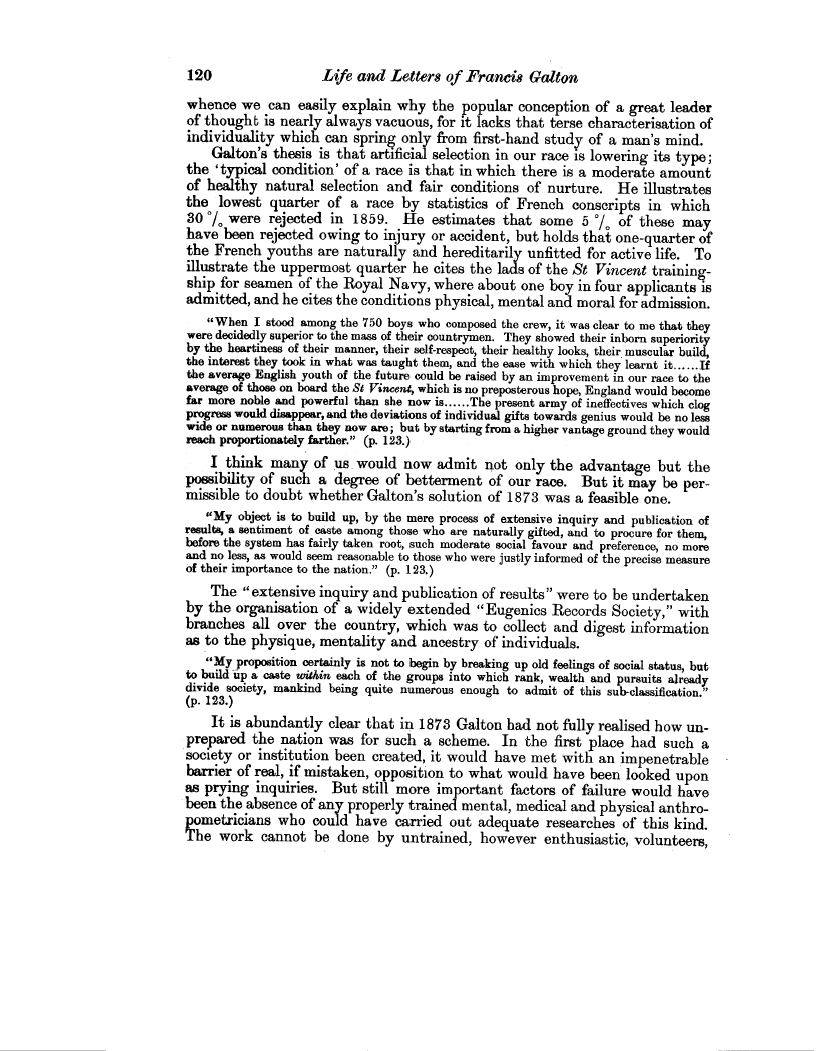120 Life and Letters of Francis Galton
whence we can easily explain why the popular conception of a great leader of thought is nearly always vacuous, for it lacks that terse characterisation of individuality which can spring only from first-hand study of a man's mind.
Galton's thesis is that artificial selection in our race is lowering its type; the `typical condition' of a race is that in which there is a moderate amount of healthy natural selection and fair conditions of nurture. He illustrates the lowest quarter of a race by statistics of French conscripts in which 30'/. were rejected in 1859. He estimates that some 5 °/o of these may have been rejected owing to injury or accident, but holds that one-quarter of the French youths are naturally and hereditarily unfitted for active life. To illustrate the uppermost quarter he cites the lads of the St Vincent trainingship for seamen of the Royal Navy, where about one boy in four applicants is admitted, and he cites the conditions physical, mental and moral for admission.
"When I stood among the 750 boys who composed the crew, it was clear to me that they were decidedly superior to the mass of their countrymen. They showed their inborn superiority by the heartiness of their manner, their self-respect, their healthy looks, their. muscular build,
the interest they took in what was taught them, and the ease with which they learnt it If the average English youth of the future could be raised by an improvement in our race to the average of those on board the St Vincent, which is no preposterous hope, England would become
far more noble and powerful than she now is The present army of ineffectives which clog progress would disappear, and the deviations of individual gifts towards genius would be no less wide or numerous than they now are; but by starting from a higher vantage ground they would
reach proportionately farther." (p. 123.)
I think many of us , would now admit not only the advantage but the possibility of such a degree of betterment of our race. But it may be permissible to doubt whether Galton's solution of 1873 was a feasible one.
"My object is to build up, by the mere process of extensive inquiry and publication of results, a sentiment of caste among those who are naturally gifted, and to procure for them, before the system has fairly taken root, such moderate social favour and preference, no more
and no less, as would seem reasonable to those who were justly informed of the precise measure of their importance to the nation." (p. 123.)
The "extensive inquiry and publication of results" were to be undertaken by the organisation of a widely extended "Eugenics Records Society," with branches all over the country, which was to collect and digest information as to the physique, mentality and ancestry of individuals.
"My proposition certainly is not to begin by breaking up old feelings of social status, but to build up a caste within each of the groups into which rank, wealth and pursuits already divide society, mankind being quite numerous enough to admit of this sub-classification." (p. 123.)
r It is abundantly clear that in 1873 Galton had not fully realised how unprepared the nation was for such a scheme. In the first place had such a society or institution been created, it would have met with an impenetrable barrier of real, if mistaken, opposition to what would have been looked upon as prying inquiries. But still more important factors of failure would have been the absence of any properly trained mental, medical and physical anthrometricians who could ave carried out adequate researches of this kind. e work cannot be done by untrained, however enthusiastic, volunteers,

